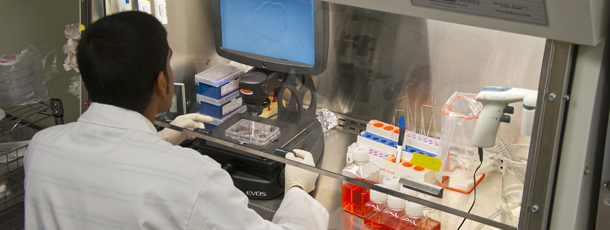The Stem Cell Program (HGINJ-SCP) was formed in 2014 as the successor to the New Jersey Stem Cell Institute. Membership is open to all researchers at Rutgers as well as all New Jersey institutions. The availability of human stem cells, particularly those prepared from subjects with known disorders, has revolutionized the ability to model disease mechanisms in living human tissues and it suggests that regenerative medicine will become a valuable component of modern medicine.
The first pluripotent human stem cells, derived from embryonic tissue, were only described in 1988. While there has been much controversy about the use of embryonic stem cells, much was learned from them, including the key proteins that could reprogram an adult cell into a pluripotent stem cell. This process led to the description of induced pluripotent stem cells (iPSC) in 2007. Since this time, there has been an explosion in the availability and use of these adult-derived stem cells. The HGINJ-SCP researchers work with the NIMH Stem Cell Center and the NINDS Human Cell & Data Repository at RUCDR Infinite Biologics®, with over 1,000 iPSC cell lines from approximately 575 subjects in the catalog.
iPSC researchers within HGINJ-SCP are primarily focused on disorders of the central nervous system. Prior to the advent of stem cells, brain tissues were difficult or impossible to obtain from donors with specific diseases. Now, starting with a skin biopsy or a blood sample, iPSC can be prepared and grown into mature cell types including neurons. Several groups have prepared iPSC from individuals with mental health disorders including schizophrenia, autism, Tourette’s, and addiction disorders. Others study neurodegenerative disorders including Alzheimer’s and Ataxia-telangiectasia. In most cases, the work is focused on discovering disease mechanisms in differentiated neurons prepared from iPSC. By understanding cellular processes that are affected by disease, it is possible to design therapies. Ultimately, disease-specific human iPSC can be used for drug screening to speed the transition from research to medicine.
Mesenchymal stem cells (MSC), also known as multipotent stromal cells or bone marrow-derived stem cells, are derived from adult bone marrow. As bone marrow transplants have been widely used for over 30 years, this type of stem cell is often cited as an example of therapeutic adult stem cells. In addition to its more common role in supporting cells that reconstitute the blood-forming and immune systems, MSC can be induced to produce a variety of cell types including those found in bone, cartilage, and fat tissue. There are many reports that MSC are effective in promoting improvement in cardiac diseases, central nervous system injuries, and lung disorders. MSC researchers at Rutgers are working on bioengineering/biomaterials solutions to aid in the delivery of therapy using these cells. Other groups are studying their use in promoting injury repair and regenerative therapy.
The HGINJ Stem Cell Program runs regular research meetings to foster collaboration and the use of shared resources to assemble highly-qualified teams of researchers for every disease model. There are also regular seminars to highlight a specific project with input from the research community.

